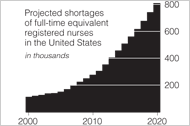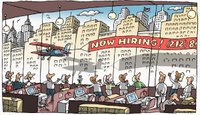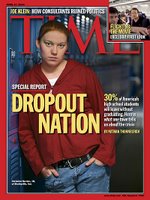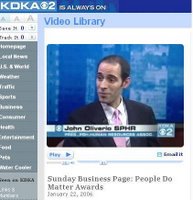 Wyoming is recruiting workers from Michigan in the hopes of addressing labor shortages and growing the economy and population. It's good to see an article that discusses the allure of rural living. So much "talent attraction" seems to stereotype a desireable locale as a city with loft apartments. Let's face it, a lot of people want more peaceful environment. And some actually like winter! Bottom line -- having a strong job offer is critical.
My other thought about this article is that it is further evidence of the labor market shortage faced by the energy industry. The problem is probably worse in a sparsely populated state such as Wyoming, but things aren't looking too good for SWPA. After all, the industry has a disproportionately older workforce and people are bound to eventually leave the workforce. My question is, "What are we doing to build a pipeline of future workers?"
Wyoming is recruiting workers from Michigan in the hopes of addressing labor shortages and growing the economy and population. It's good to see an article that discusses the allure of rural living. So much "talent attraction" seems to stereotype a desireable locale as a city with loft apartments. Let's face it, a lot of people want more peaceful environment. And some actually like winter! Bottom line -- having a strong job offer is critical.
My other thought about this article is that it is further evidence of the labor market shortage faced by the energy industry. The problem is probably worse in a sparsely populated state such as Wyoming, but things aren't looking too good for SWPA. After all, the industry has a disproportionately older workforce and people are bound to eventually leave the workforce. My question is, "What are we doing to build a pipeline of future workers?"
Wednesday, September 13, 2006
Talent Attraction, Wyoming Style
 Wyoming is recruiting workers from Michigan in the hopes of addressing labor shortages and growing the economy and population. It's good to see an article that discusses the allure of rural living. So much "talent attraction" seems to stereotype a desireable locale as a city with loft apartments. Let's face it, a lot of people want more peaceful environment. And some actually like winter! Bottom line -- having a strong job offer is critical.
My other thought about this article is that it is further evidence of the labor market shortage faced by the energy industry. The problem is probably worse in a sparsely populated state such as Wyoming, but things aren't looking too good for SWPA. After all, the industry has a disproportionately older workforce and people are bound to eventually leave the workforce. My question is, "What are we doing to build a pipeline of future workers?"
Wyoming is recruiting workers from Michigan in the hopes of addressing labor shortages and growing the economy and population. It's good to see an article that discusses the allure of rural living. So much "talent attraction" seems to stereotype a desireable locale as a city with loft apartments. Let's face it, a lot of people want more peaceful environment. And some actually like winter! Bottom line -- having a strong job offer is critical.
My other thought about this article is that it is further evidence of the labor market shortage faced by the energy industry. The problem is probably worse in a sparsely populated state such as Wyoming, but things aren't looking too good for SWPA. After all, the industry has a disproportionately older workforce and people are bound to eventually leave the workforce. My question is, "What are we doing to build a pipeline of future workers?"
Tuesday, August 29, 2006
What Happened to US Air?
 Five years ago Pittsburgh received some particularly bad economic news -- US Airways announced that it planned to lay off a significant number of workers. Politicians and community leaders scrambled to respond and promises for worker assistance were made. So what happened to the former US Airways workers?
In a few weeks, the Institute of Politics will release a "Case in Point" publication that looks at how our region's workforce system responded to these layoffs. There's a story on the topic in last weekend's Tribune Review. http://www.pittsburghlive.com/x/pittsburghtrib/business/s_467929.html
One of the most striking "lessons learned" is the fact that our workforce system does not do a very robust job tracking its own performance. Thus, we have insufficient data about who we served, how we served them and what happened as a result.
Five years ago Pittsburgh received some particularly bad economic news -- US Airways announced that it planned to lay off a significant number of workers. Politicians and community leaders scrambled to respond and promises for worker assistance were made. So what happened to the former US Airways workers?
In a few weeks, the Institute of Politics will release a "Case in Point" publication that looks at how our region's workforce system responded to these layoffs. There's a story on the topic in last weekend's Tribune Review. http://www.pittsburghlive.com/x/pittsburghtrib/business/s_467929.html
One of the most striking "lessons learned" is the fact that our workforce system does not do a very robust job tracking its own performance. Thus, we have insufficient data about who we served, how we served them and what happened as a result.
Tuesday, August 08, 2006
Picture This
A large auditorium is filled with high school students. They're beginning a week of healthcare career exploration activities. They shout out the names of the healthcare professions they know. “Doctor!” “Nurse!” “Dentist!” The lights dim and the students see picture of an emergency room. Text appears above the people in the picture, identifying their job and regional labor statistics. “What’s a radiology tech?” one student asks. “What’s an Associate’s degree?” asks another. With a look of shock, a girl in the front row whispers, “Those numbers can’t be right. I thought everyone in healthcare was rich.”
Monday, July 31, 2006
Be What I Want to Be
Wednesday, July 19, 2006
Career Research Websites
Wednesday, July 05, 2006
Singapore Luring Away Top US Talent
Teens Want Jobs
Tuesday, June 27, 2006
The Aging Workforce Opportunity
Friday, June 16, 2006
Not Work Ready
Tomorrow's Workforce
Friday, May 26, 2006
Blogging Job Seekers
Wednesday, May 24, 2006
Boomers Discover Career Counseling for College Kids
Outsourcing Nursing Education?
 Immigration is once again a very hot topic in the news. It's nice to finally see an article that expands the discussion beyond the low wage job debate. In fact, today's NYTimes discusses the proposed US Senate immigration bill. This bill eliminates the cap on immigrant nurses, opening our doors wide open to much needed trained nurses. Will unlimited foreign nurse recruitment solve the US nurse shortage or create an international crisis by depleting developing countries of their much needed medical talent? It may do both.
Why can't we train enough nurses in the US? It's not for lack of qualified applicants. In fact, there are more qualified people seeking nursing education than there are places to educate them. "In 2005, American nursing schools rejected almost 150,000 applications from qualified people, according to the National League for Nursing, a nonprofit group that counts more than 1,100 nursing schools among its members." Read more here...
Immigration is once again a very hot topic in the news. It's nice to finally see an article that expands the discussion beyond the low wage job debate. In fact, today's NYTimes discusses the proposed US Senate immigration bill. This bill eliminates the cap on immigrant nurses, opening our doors wide open to much needed trained nurses. Will unlimited foreign nurse recruitment solve the US nurse shortage or create an international crisis by depleting developing countries of their much needed medical talent? It may do both.
Why can't we train enough nurses in the US? It's not for lack of qualified applicants. In fact, there are more qualified people seeking nursing education than there are places to educate them. "In 2005, American nursing schools rejected almost 150,000 applications from qualified people, according to the National League for Nursing, a nonprofit group that counts more than 1,100 nursing schools among its members." Read more here...
Wednesday, May 17, 2006
Aging Workforce News
Friday, May 05, 2006
FL May Mandate Middle School Career Programs
Wednesday, May 03, 2006
Super Wednesday
 On Wednesday, May 10th, Enrico's Tazza D'Oro Cafe, the Union Project, the Urban League of Pittsburgh and the University of Pittsburgh Human Capital Policy Initiative will welcome Mark Roosevelt, Superintendent of Pittsburgh Public Schools to a community forum focused on the future of our schools.
Please note that the date for this event recently changed. The forum will be held on Wednesday, May 10, 2006 at the Union Project (801 N. Negley Avenue, Pittsburgh, PA) from 6:30-8:00 pm. (The event was previously scheduled for 5/4).
Mark Roosevelt will be joined by community and educational leaders for this important discussion. Other speakers will include: Esther Bush (Urban League of Pittsburgh), Michael Johnson (Carnegie Mellon University), Vic Papale (A+ Schools), and Muzz Meyers (Westinghouse High School).
Community input is essential to the discussion. Please join us for this very important conversation.
On Wednesday, May 10th, Enrico's Tazza D'Oro Cafe, the Union Project, the Urban League of Pittsburgh and the University of Pittsburgh Human Capital Policy Initiative will welcome Mark Roosevelt, Superintendent of Pittsburgh Public Schools to a community forum focused on the future of our schools.
Please note that the date for this event recently changed. The forum will be held on Wednesday, May 10, 2006 at the Union Project (801 N. Negley Avenue, Pittsburgh, PA) from 6:30-8:00 pm. (The event was previously scheduled for 5/4).
Mark Roosevelt will be joined by community and educational leaders for this important discussion. Other speakers will include: Esther Bush (Urban League of Pittsburgh), Michael Johnson (Carnegie Mellon University), Vic Papale (A+ Schools), and Muzz Meyers (Westinghouse High School).
Community input is essential to the discussion. Please join us for this very important conversation.
Paying for Career Planning
 Now I understand the critical career planning article I mentioned in an earlier post. Apparently, the April 25th Washington Post included a piece about the rise in career counseling services for kids. The article highlights efforts by the Boys and Girls Club, College Recruiter and others.
The story mentions some positive and negative points of career planning. However, it is an overwhelmingly positive story. The main critiques: career planning places too much stress on kids and kids need life skills ed, not career planning. Isn't finding and keeping a job an important life skill?
I'm taking great pleasure in this increased attention to career planning. I'm even excited about the critical commentary. Who knew people are think about this enough to form an opinion?
I'm no Pollyanna. The career counseling field has a great deal of variety in quality. (For an in-depth look at this, you must read Barbara Ehrenreich's book, Bait & Switch.)
I'm also a little nervous about services that promote 10-year plans for teens. (See Career Choices website. Upon closer inspection, it's not nearly as scary as it sounds. They aren't asking kids to make a one time decision that will limit choices. They're aligning education and career interests. I think they have a marketing problem, not a product problem.)
One of the themes of the article is that career planning is an emerging industry. There's an increased consumer interest and lots of emerging efforts to meet this market demand. This is good and bad news for consumers. More choices means more tough decisions. How do you choose wisely?
Now I understand the critical career planning article I mentioned in an earlier post. Apparently, the April 25th Washington Post included a piece about the rise in career counseling services for kids. The article highlights efforts by the Boys and Girls Club, College Recruiter and others.
The story mentions some positive and negative points of career planning. However, it is an overwhelmingly positive story. The main critiques: career planning places too much stress on kids and kids need life skills ed, not career planning. Isn't finding and keeping a job an important life skill?
I'm taking great pleasure in this increased attention to career planning. I'm even excited about the critical commentary. Who knew people are think about this enough to form an opinion?
I'm no Pollyanna. The career counseling field has a great deal of variety in quality. (For an in-depth look at this, you must read Barbara Ehrenreich's book, Bait & Switch.)
I'm also a little nervous about services that promote 10-year plans for teens. (See Career Choices website. Upon closer inspection, it's not nearly as scary as it sounds. They aren't asking kids to make a one time decision that will limit choices. They're aligning education and career interests. I think they have a marketing problem, not a product problem.)
One of the themes of the article is that career planning is an emerging industry. There's an increased consumer interest and lots of emerging efforts to meet this market demand. This is good and bad news for consumers. More choices means more tough decisions. How do you choose wisely?
Monday, May 01, 2006
Anti-Career Planning Article
Thursday, April 27, 2006
Surprising Hiring Practices
 How do you think a corporate recruiter finds people to fill positions? Are you envisioning a stack of resumes? A job fair?
Most people assume that hiring managers select from a pool of people who are actually looking for a new job. However, companies are realizing that the best pool of candidates is already working. They may even be working in an entirely different field!
Check out this NYTimes article about modern recruiting practices. San Franciso State management guru, Dr. John Sullivan contributes to the article. Sullivan has the best quote: "The first rule of recruiting is that the best people already have jobs they like... It's amazing that so many companies still use job fairs to recruit talent. Who goes to job fairs? People without jobs! All you get are worthless résumés and lots of germs."
What's the alternative? According to this article: walking the aisles of chain stores and restaurants, buying merchandise, ordering meals nad keeping an eye out for stand-out employees is the best way to find true talent.
Read more...
How do you think a corporate recruiter finds people to fill positions? Are you envisioning a stack of resumes? A job fair?
Most people assume that hiring managers select from a pool of people who are actually looking for a new job. However, companies are realizing that the best pool of candidates is already working. They may even be working in an entirely different field!
Check out this NYTimes article about modern recruiting practices. San Franciso State management guru, Dr. John Sullivan contributes to the article. Sullivan has the best quote: "The first rule of recruiting is that the best people already have jobs they like... It's amazing that so many companies still use job fairs to recruit talent. Who goes to job fairs? People without jobs! All you get are worthless résumés and lots of germs."
What's the alternative? According to this article: walking the aisles of chain stores and restaurants, buying merchandise, ordering meals nad keeping an eye out for stand-out employees is the best way to find true talent.
Read more...
Tuesday, April 25, 2006
Discrimination or Standard Operating Procedure
Thursday, April 20, 2006
Smart Policy Workforce Blog
Grey Matters
 Although your own retirement may seem like a far off fantasy world, I've got news for you -- you'd better start thinking about how mass retirements could impact your future. Is your business (or organization) prepared for the aging of its workforce? (If you're in mining, coal, utilities, primary metals or ground transportation business; you'd better start thinking about it!)
Understanding the implications of population dynamics is also essential for economic and workforce development professionals. For those investing in our region's economic competitiveness, retirements could seriously change the way they do business. Key questions to consider: Are there particular industries that will be particularly hard hit by retirements? Are businesses planning for a workforce shortage? Are employers restructuring their businesses to address future brain drain? Will this spell opportunity for younger workers or attempts to retain older employees? Finally, does the aging of our population present unique opportunities for economic development?
So many questions...
And now for some answers (or at least better questions)...The Carnegie Mellon University's Center for Economic Development has conducted a study on behalf of the Three Rivers Workforce Investment Board, "Managing the Changing Workforce in Southwestern Pennsylvania: A Closer Look at Issues Related to Our Region's Aging Workforce." This report explores the issue and examines how changing demographics may shape the future of the region. Read the report here.
The Institute of Politics will conduct a series of events to promote dialogue and action on this topic. Our first event is a forum on June 23rd, "The Aging of the Workforce: Crisis or Opportunity." To receive an invite to the event, please contact me at vkl1@pitt.edu.
Although your own retirement may seem like a far off fantasy world, I've got news for you -- you'd better start thinking about how mass retirements could impact your future. Is your business (or organization) prepared for the aging of its workforce? (If you're in mining, coal, utilities, primary metals or ground transportation business; you'd better start thinking about it!)
Understanding the implications of population dynamics is also essential for economic and workforce development professionals. For those investing in our region's economic competitiveness, retirements could seriously change the way they do business. Key questions to consider: Are there particular industries that will be particularly hard hit by retirements? Are businesses planning for a workforce shortage? Are employers restructuring their businesses to address future brain drain? Will this spell opportunity for younger workers or attempts to retain older employees? Finally, does the aging of our population present unique opportunities for economic development?
So many questions...
And now for some answers (or at least better questions)...The Carnegie Mellon University's Center for Economic Development has conducted a study on behalf of the Three Rivers Workforce Investment Board, "Managing the Changing Workforce in Southwestern Pennsylvania: A Closer Look at Issues Related to Our Region's Aging Workforce." This report explores the issue and examines how changing demographics may shape the future of the region. Read the report here.
The Institute of Politics will conduct a series of events to promote dialogue and action on this topic. Our first event is a forum on June 23rd, "The Aging of the Workforce: Crisis or Opportunity." To receive an invite to the event, please contact me at vkl1@pitt.edu.
Tuesday, April 18, 2006
Best Jobs List
Career Exploration Vacation
 Summer doesn’t just mean pool parties and sleeping late. Encourage the young people you know to use their break from school to explore career options. Below are places to check out for expanding career vision and personal growth, both locally and globally.
Camp Invention
Camp Invention is a weeklong summer enrichment day program offered in local communities for children entering first through sixth grades. This exciting program invites children to let their imaginations run wild through teamwork, creative problem solving, and inventive thinking.
Engineering and Technology Exploring Academy
Westmoreland County Community College Career Prep Program and the Boy Scouts of America have partnered to bring a three day exploration cap to the Westmoreland County Community College Youngwood Campus for students who will be enrolled in grades 8-11 during the 2006-2007 school year. Contact Paula Rendine at 724-925-4268 or rendinep@wcc-pa.edu for more information and a registration packet.
Manufacturing Career Exploration Program
The Manufacturing Career Exploration Program will engage participating youth in activities that will demonstrate the diverse, high skill careers that exist in the manufacturing industry and provide participants with the opportunity to develop and demonstrate personal skills in communication, teamwork and problem solving.
Summer in the City- Explore, Experiment, Experience, Point Park University
From engineering to movie producing, students in middle in high school can explore a number of careers through Point Park’s Summer in the City programs.
Women In Engineering MTM ’06 Camp- Penn State University
High school girls who are entering 9th through 12th grades are eligible. Applicants should like science and math and should have the desire to learn more about engineering.
YWCA of Westmoreland County
Camps include Robo Labs and Creating a Video/Public Service Announcement.
Council on International Educational Exchange
Go abroad or share your home and your lifestyle with a CIEE international high school student.
Rotary Youth Exchange
Rotary Youth Exchange provides thousands of young people with the opportunity to meet people from other lands and to experience their cultures.
Youth for Understanding
Youth For Understanding (YFU) is a non-profit educational organization which offers opportunities for young people around the world to spend a summer, semester or year with a host family in another culture. Many opportunities are free or very low cost.
And for the grown ups who are thinking about career exploration, check out Vocation Vacations.
Special thanks to Anne McCafferty, Michelle DeLuca, and Terri Campbell for providing career exploration vacation information.
Summer doesn’t just mean pool parties and sleeping late. Encourage the young people you know to use their break from school to explore career options. Below are places to check out for expanding career vision and personal growth, both locally and globally.
Camp Invention
Camp Invention is a weeklong summer enrichment day program offered in local communities for children entering first through sixth grades. This exciting program invites children to let their imaginations run wild through teamwork, creative problem solving, and inventive thinking.
Engineering and Technology Exploring Academy
Westmoreland County Community College Career Prep Program and the Boy Scouts of America have partnered to bring a three day exploration cap to the Westmoreland County Community College Youngwood Campus for students who will be enrolled in grades 8-11 during the 2006-2007 school year. Contact Paula Rendine at 724-925-4268 or rendinep@wcc-pa.edu for more information and a registration packet.
Manufacturing Career Exploration Program
The Manufacturing Career Exploration Program will engage participating youth in activities that will demonstrate the diverse, high skill careers that exist in the manufacturing industry and provide participants with the opportunity to develop and demonstrate personal skills in communication, teamwork and problem solving.
Summer in the City- Explore, Experiment, Experience, Point Park University
From engineering to movie producing, students in middle in high school can explore a number of careers through Point Park’s Summer in the City programs.
Women In Engineering MTM ’06 Camp- Penn State University
High school girls who are entering 9th through 12th grades are eligible. Applicants should like science and math and should have the desire to learn more about engineering.
YWCA of Westmoreland County
Camps include Robo Labs and Creating a Video/Public Service Announcement.
Council on International Educational Exchange
Go abroad or share your home and your lifestyle with a CIEE international high school student.
Rotary Youth Exchange
Rotary Youth Exchange provides thousands of young people with the opportunity to meet people from other lands and to experience their cultures.
Youth for Understanding
Youth For Understanding (YFU) is a non-profit educational organization which offers opportunities for young people around the world to spend a summer, semester or year with a host family in another culture. Many opportunities are free or very low cost.
And for the grown ups who are thinking about career exploration, check out Vocation Vacations.
Special thanks to Anne McCafferty, Michelle DeLuca, and Terri Campbell for providing career exploration vacation information.
More Educated, but Still Losing Top Talent
Monday, April 17, 2006
Rendell & O'Connor Recognize Human Capital Investments
 Congratulations to the 2005-2006 People Do Matter award winners! The winners were announced at a highly-anticipated and sold out award ceremony on Wed., April 5, 2006. Pennsylvania Governor Edward Rendell delivered the event keynote and joined Pittsburgh mayor, Bob O'Connor and other regional leaders to recognize the achievements of the region's best companies.
Be sure to give a special shout out to this year's winners:
The Federal Reserve Bank of Cleveland, Pittsburgh Branch was recognized for increasing employee retention, building relationships and adaptive skills, and becoming an employer of choice through the creation of the "Welcome and Succeed Program."
Kennametal won top honors in the Learning and Development category for overcoming changing market dynamics and new competitive challenges through the "Customer Acquisition Process" -- a learning and development strategy that built a stronger sales culture.
Finally, the Human Resources Collaborative was recognized for building an innovative shared service model that both saved money and improved human resource services.
Thanks to the many individuals and organizations that contributed to the event's success.
Download a program book with detailed descriptions of all of this year's finalists.
Congratulations to the 2005-2006 People Do Matter award winners! The winners were announced at a highly-anticipated and sold out award ceremony on Wed., April 5, 2006. Pennsylvania Governor Edward Rendell delivered the event keynote and joined Pittsburgh mayor, Bob O'Connor and other regional leaders to recognize the achievements of the region's best companies.
Be sure to give a special shout out to this year's winners:
The Federal Reserve Bank of Cleveland, Pittsburgh Branch was recognized for increasing employee retention, building relationships and adaptive skills, and becoming an employer of choice through the creation of the "Welcome and Succeed Program."
Kennametal won top honors in the Learning and Development category for overcoming changing market dynamics and new competitive challenges through the "Customer Acquisition Process" -- a learning and development strategy that built a stronger sales culture.
Finally, the Human Resources Collaborative was recognized for building an innovative shared service model that both saved money and improved human resource services.
Thanks to the many individuals and organizations that contributed to the event's success.
Download a program book with detailed descriptions of all of this year's finalists.
Tuesday, April 11, 2006
Going Places
Discovering Drop Outs
 This month's TIME magazine covers the hidden problem of high school drop out rates. While there's great debate about the numbers, many researchers believe that 33% of public high school graduates will drop out. The numbers are much worse for Latinos and African Americans who experience dropout rates approaching 50%. In some states, legislators are taking action. Credit recovery programs and alternative environments are popular solutions. Disincentives are also being used (e.g., taking away driving or work permit priviledges.)
It's good to see mainstream coverage of this awful problem. High school dropouts fare horribly in today's economy. Employers want to see a diploma. Completing high school not only tells the employer that you have certain skills, it says that you're committed to completing something.
The TIME story is interesting, but the really good stuff is in a related report by the Bill & Melinda Gates Foundation, "The Silent Epidemic." Check out these factoids:
Why do students drop out?
* 47 percent of dropouts said classes weren't interesting
* 43 percent had missed too many days of school and couldn't catch up
* 38 percent said they had too much freedom and not enough rules in life
* 35 percent said they quit because they were failing in school
* 32 percent said they had to get a job and make money
What are dropouts' experiences in high school?
* 88 percent had passing grades, and 70 percent said they could have graduated if they had tried
* 69 percent were not motivated to work hard; 66 percent would have worked harder if more had been demanded of them
How do dropouts feel about their decision?
* 81 percent said they now believe graduating from high school is important to success in life
* 74 percent said if they were able to relive the experience, they would have stayed in school
* 47 percent agreed it was hard to find a good job without a diploma
What might have kept dropouts in school?
* 81 percent called for more "real-world" learning opportunities
* 75 percent wanted smaller classes with more individual instruction
* 71 percent favored better communication between parents and schools and more involvement from parents
I know I'm completely biased, but I think these kids are starving for career education and work experience programs.
TIME article available here (if you subscribe): http://www.time.com/time/magazine/article/0,9171,1181646,00.html
Additional info available in a Bill & Melinda Gates Foundation report, "The Silent Epidemic"
http://www.gatesfoundation.org/Education/TransformingHighSchools/RelatedInfo/SilentEpidemic.htm
This month's TIME magazine covers the hidden problem of high school drop out rates. While there's great debate about the numbers, many researchers believe that 33% of public high school graduates will drop out. The numbers are much worse for Latinos and African Americans who experience dropout rates approaching 50%. In some states, legislators are taking action. Credit recovery programs and alternative environments are popular solutions. Disincentives are also being used (e.g., taking away driving or work permit priviledges.)
It's good to see mainstream coverage of this awful problem. High school dropouts fare horribly in today's economy. Employers want to see a diploma. Completing high school not only tells the employer that you have certain skills, it says that you're committed to completing something.
The TIME story is interesting, but the really good stuff is in a related report by the Bill & Melinda Gates Foundation, "The Silent Epidemic." Check out these factoids:
Why do students drop out?
* 47 percent of dropouts said classes weren't interesting
* 43 percent had missed too many days of school and couldn't catch up
* 38 percent said they had too much freedom and not enough rules in life
* 35 percent said they quit because they were failing in school
* 32 percent said they had to get a job and make money
What are dropouts' experiences in high school?
* 88 percent had passing grades, and 70 percent said they could have graduated if they had tried
* 69 percent were not motivated to work hard; 66 percent would have worked harder if more had been demanded of them
How do dropouts feel about their decision?
* 81 percent said they now believe graduating from high school is important to success in life
* 74 percent said if they were able to relive the experience, they would have stayed in school
* 47 percent agreed it was hard to find a good job without a diploma
What might have kept dropouts in school?
* 81 percent called for more "real-world" learning opportunities
* 75 percent wanted smaller classes with more individual instruction
* 71 percent favored better communication between parents and schools and more involvement from parents
I know I'm completely biased, but I think these kids are starving for career education and work experience programs.
TIME article available here (if you subscribe): http://www.time.com/time/magazine/article/0,9171,1181646,00.html
Additional info available in a Bill & Melinda Gates Foundation report, "The Silent Epidemic"
http://www.gatesfoundation.org/Education/TransformingHighSchools/RelatedInfo/SilentEpidemic.htm
Good Economic News
Tuesday, April 04, 2006
How Much Do You Need?
Friday, March 31, 2006
What Do You Tell Tomorrow's Teachers?
Thursday, March 30, 2006
Hot Date on April 28
 Please consider joining me at the Mon Valley Education Consortium's "Designing Our Destiny" event on Friday, April 28th at the Pittsburgh Marriott City Center from 5:30-7:30 pm. The event highlights the Consortium's student career exploration program, "The Future is Mine." This celebration will give you the chance to see how students learn about the world of work. I think you'll be impressed by the creativity, energy and determination of the students.
Let's face it, career development activities are few and far between in our school system. This is a great opportunity to show that you think it's important to prepare kids for the world of work. The exhibit hall format also gives you the chance to learn at your own pace. (This means you won't be stuck sitting through a long program!)
Reservations are necessary. RSVP by Wednesday, April 19, to the Consortium office at 412-678-9215.
Please consider joining me at the Mon Valley Education Consortium's "Designing Our Destiny" event on Friday, April 28th at the Pittsburgh Marriott City Center from 5:30-7:30 pm. The event highlights the Consortium's student career exploration program, "The Future is Mine." This celebration will give you the chance to see how students learn about the world of work. I think you'll be impressed by the creativity, energy and determination of the students.
Let's face it, career development activities are few and far between in our school system. This is a great opportunity to show that you think it's important to prepare kids for the world of work. The exhibit hall format also gives you the chance to learn at your own pace. (This means you won't be stuck sitting through a long program!)
Reservations are necessary. RSVP by Wednesday, April 19, to the Consortium office at 412-678-9215.
Wednesday, March 29, 2006
Gaming ROI
Monday, March 27, 2006
Too Many Skilled Workers?
Friday, March 24, 2006
Women in Higher Ed.: Too Many or Not Enough?
Tuesday, March 21, 2006
Career Exploration -- Not Just for Kids
Monday, March 13, 2006
Fun and Games
 I came across this list of old fashioned job titles and thought they were worth sharing. (I like to use this as a trivia game when presenting to student audiences.)
Do you know what these people did for a living?
Town husband, tinkerer, ratoner, streaker, skinker, loblolly boy, honeydipper, hello girl, bookman?
A town husband was employed by the parish to collect money from fathers of illegitimate children for their upkeep. A tinkerer was a traveling repairman. A streaker prepared bodies for burial. A skinker was a tapster in an ale house. A ratoner was a rat catcher. A loblolly boy was a ship's doctor's assistant or errand boy. A honey dipper extracted raw sewage from out-houses. A hello girl was a telephone employee in the early 1900s. Finally, a bookman was a student.
Doesn't this make you love your job?
I came across this list of old fashioned job titles and thought they were worth sharing. (I like to use this as a trivia game when presenting to student audiences.)
Do you know what these people did for a living?
Town husband, tinkerer, ratoner, streaker, skinker, loblolly boy, honeydipper, hello girl, bookman?
A town husband was employed by the parish to collect money from fathers of illegitimate children for their upkeep. A tinkerer was a traveling repairman. A streaker prepared bodies for burial. A skinker was a tapster in an ale house. A ratoner was a rat catcher. A loblolly boy was a ship's doctor's assistant or errand boy. A honey dipper extracted raw sewage from out-houses. A hello girl was a telephone employee in the early 1900s. Finally, a bookman was a student.
Doesn't this make you love your job?
Monday, February 27, 2006
Work Hard, Earn Less
If you ever doubted the brutality of the labor market, take a look at articles in yesterday’s New York Times or today’s Christian Science Monitor.
Today's Christian Science Monitor also looks at the struggle of younger workers. On many measures, younger workers are falling behind. Median incomes are falling for younger households, education costs are rising dramatically -- leaving younger workers with high student loan and credit card debts, and rising healthcare costs are being shifted to the new workforce.
This is why we need HCPI speakers to get into the community and provoke thought and action with regard to career education and workforce development. Talking about what's wrong with the labor market only gets you so far. We've got to give people the tools to succeed.
Finally, I should mention that I wanted to also recommend an article by Paul Krugman about rising economic inequality. Ironically, though, you can only view the article online if you pay for/subscribe to NYTimes Select. Once again, the poor get imperfect market information.
Tuesday, February 21, 2006
HCPI Reception
Secrets of College Success
Tuesday, February 07, 2006
Are We Measuring What Matters?
 Do traditional economic measures work in a knowledge economy? This Business Week article argues that they do not. In fact, many knowledge building investments are simply not measured. For example, in the olden days companies spent a lot of money to train people. (You had to fly people to a training facility, hire instructors, pay overhead, etc.) Now you can take classes online. "At IBM, the training budget fell by $10 million from 2003 to 2004, a 1.4% decline, while the number of classroom and e-learning hours rose by 29%." As it stands, traditional economic measures fail to capture these types of productivity improvements.
Another interesting calculation -- the ROI of immigration. If immigrants come to the US already educated, they are adding to the economic value of the nation. "Most of the workers who immigrate to the U.S. each year have at least a high school diploma, while about a third have a college education or better. Since it costs, on average, roughly $100,000 to provide 12 years of elementary and secondary education, and another $100,000 to pay for a college degree, immigrants are providing a subsidy of at least $50 billion annually to the U.S. economy in free human capital. Alternatively, valuing their contribution to the economy by the total wages they expect to earn during their lifetime would put the value of the human capital of new immigrants closer to $200 billion per year." Read more...
Do traditional economic measures work in a knowledge economy? This Business Week article argues that they do not. In fact, many knowledge building investments are simply not measured. For example, in the olden days companies spent a lot of money to train people. (You had to fly people to a training facility, hire instructors, pay overhead, etc.) Now you can take classes online. "At IBM, the training budget fell by $10 million from 2003 to 2004, a 1.4% decline, while the number of classroom and e-learning hours rose by 29%." As it stands, traditional economic measures fail to capture these types of productivity improvements.
Another interesting calculation -- the ROI of immigration. If immigrants come to the US already educated, they are adding to the economic value of the nation. "Most of the workers who immigrate to the U.S. each year have at least a high school diploma, while about a third have a college education or better. Since it costs, on average, roughly $100,000 to provide 12 years of elementary and secondary education, and another $100,000 to pay for a college degree, immigrants are providing a subsidy of at least $50 billion annually to the U.S. economy in free human capital. Alternatively, valuing their contribution to the economy by the total wages they expect to earn during their lifetime would put the value of the human capital of new immigrants closer to $200 billion per year." Read more...
Friday, February 03, 2006
Engineering Dream Jobs
This special issue of IEEE Spectrum tells you all about the coolest engineering jobs. I have to say -- they're way cool. Martin Cooper uses lasers to restore priceless works of art. Grant Imahara builds that weird stuff you see on the Discovery Channel show -- MythBusters. And this guy tracks wild animals. The core message -- do something you love, be tenacious and flexible. And look out for the rhinos.
Tuesday, January 31, 2006
The Power of Belief
Tuesday, January 24, 2006
The Grit Factor
 Penn researcher, Angela Lee Duckworth tells us that intellectual superstars aren't successful just because they're smart -- it's because they've got "grit" or persistence. In a study of West Point freshman cadets, Duckworth found that grit predicted successful completion of their summer training program. Grit beat out high school class rank, SAT scores, athletic achievement, community leadership experience and faculty appraisals.
Can we teach grit or is success limited to obsessive compulsives? Duckworth and other researchers suggest that it's time to teach persistence and help kids understand how to overcome obstacles. Another strong suggestion is to the parents. "The most important thing parents can do to help kids succeed is to guide them in finding whatever it is they can love over the long haul." Read more...
Penn researcher, Angela Lee Duckworth tells us that intellectual superstars aren't successful just because they're smart -- it's because they've got "grit" or persistence. In a study of West Point freshman cadets, Duckworth found that grit predicted successful completion of their summer training program. Grit beat out high school class rank, SAT scores, athletic achievement, community leadership experience and faculty appraisals.
Can we teach grit or is success limited to obsessive compulsives? Duckworth and other researchers suggest that it's time to teach persistence and help kids understand how to overcome obstacles. Another strong suggestion is to the parents. "The most important thing parents can do to help kids succeed is to guide them in finding whatever it is they can love over the long haul." Read more...
Monday, January 23, 2006
Sunday TV: People Do Matter
 This Sunday, Jon Delano aired a segment about the "People Do Matter" initiative. People Do Matter recognizes companies for outstanding accomplishments in human resources, training and organizational development.
View the video clip here...
Learn more about PDM (nominate an organization!) here...
This Sunday, Jon Delano aired a segment about the "People Do Matter" initiative. People Do Matter recognizes companies for outstanding accomplishments in human resources, training and organizational development.
View the video clip here...
Learn more about PDM (nominate an organization!) here...


